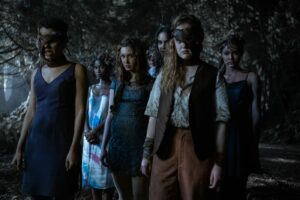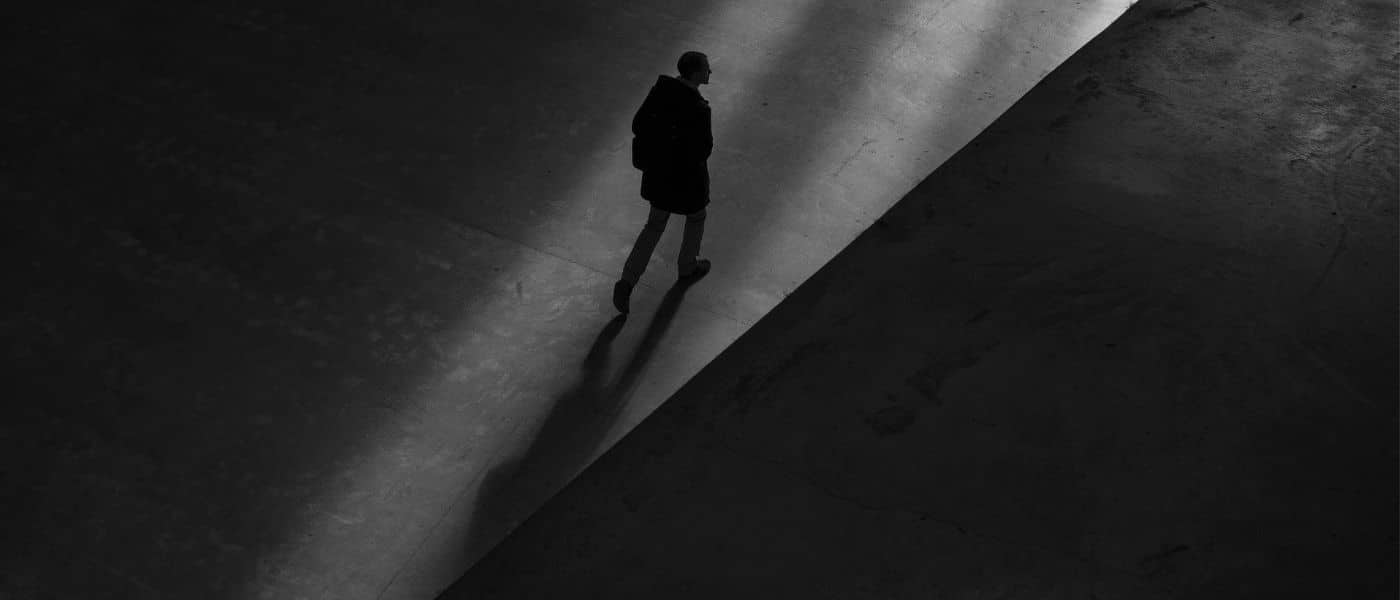
Yellowjackets and the way we hunger
Opinion + AnalysisRelationshipsSociety + Culture
BY Joseph Earp 10 MAY 2022
Yellowjackets, with its widely acclaimed first season, has a more disturbing element than its surface of considerable violence and horror.
Sure, the Showtime series, which follows a group of young athletes as they crash-land following a disastrous plane trip in the middle of the wilderness and turn, with visceral, enjoyable brevity, to cannibalism and taboo-shattering behaviour, contains a lot in the way of gore. There are broken limbs; bodies eating up bodies; physically construed nightmares which the protagonists cannot escape.
But underneath that immediate level of violence is a claim, considerably more unsettling than fractured calcium, that our ethical systems are far from stable and robust. We’re not bent towards virtue. We seem to be shaped in the opposite way. Yellowjackets knows that. And more than that, the show loves it.
Corruption Seeps In, Naturally
Yellowjacket’s “heroes” – a word which only means to indicate those characters who are applied with a particular, and frequently intense, narrative scrutiny – are the stereotypes of “ordinary” people. The show, which flips back and forth between the present and the deep, traumatic past, makes a great deal of effort to depict that. There are extended shots of the central characters, moving their way through the world, not even thinking about the trauma they inflicted on others, deep in their pasts.
Indeed, the flashback structure of proceedings, one that allows the central mystery to unfurl slowly – who ate who, following that terrible plane crash? – mines much from the main characters’ attempts to live their lives freely in the aftermath of their great collectively-constructed horror.
In the show’s temporal present, these plane crash survivors are all people who wake up every day, and apply themselves to their jobs, and are loved and love in turn. You’d meet them, and catch their eyes in a shopping centre, and smile, astonishingly oblivious of their histories. It’s only when we get painful stabs of their past, unfolded in flashback, that we come to understand that there is something hiding here; a history streaked by vicious behaviour.
That “something” can’t be pinned down to the specifics of our heroes’ lives, either. We can’t shirk the implication that we’d fail to avoid the same behaviour – it is nothing less than the human capacity for violence. We are all confronted, more frequently than we would like to admit, with the idea that we have a potential for evil.
Remember that time you stood on the train platform, and considered, all of a sudden, pushing a stranger onto the tracks? Not for any reason – just because you could. Because, despite what we hope ethics might teach us, there’s something actively joyful about vicious behaviour.
Yellowjackets doesn’t make anything extraordinary out of its central characters. These are just human beings, ones who happen to have been freed – predictably, almost boringly – from the social code of morality, and plunged into horror. We all could be there. All that Yellowjackets tells us is that, most worrying of all, we would enjoy it.

So Why?
The philosopher David Hume constructed his ethical system out of twin poles: pleasure and pain. Hume believed that we all have a natural repulsion to pain, and an attraction to pleasure. That, for him, was the foundation of all ethical behaviour, the starting point that explains empathy, charity, and goodness.
Yellowjackets tells us that’s not true. The show’s spark of originality is not to prove that we all have a propensity for inflicting suffering. That’s already been explored through multiple works of art – consider, for example, the Netflix smash hit Squid Game, which should be considered the contemporary final word on what happens when you guide desperate people towards viciousness.
No. What makes Yellowjackets special is that its central characters have spent the rest of their lives following the plane crash pursuing the highs of gnawing on another human being. They’re not tortured – they’re hungry.

We Do What We Want – Thank God
If that sounds horrifically bleak, it’s because, despite its considerable vein of humour, Yellowjackets is horrifically bleak. We are inundated with art that aims to provide us with a moral compass, designating bad and good behaviour, and telling us how to navigate both. The thematic work, quite often, in these pieces of popular culture, is to condition us emotionally – to train us to be repulsed by horror, and drawn to goodness.
Yellowjackets does not do this. It makes the horrendous appear attractive: “look at these regular people, who ate one another, and defied the social norm, and found themselves in the process.” And it makes the virtuous seem weak: “look at those fools who let their sense of goodness stop them from doing what they want to do.”
If there’s any hope here, then, it’s our capacity to understand pleasure and pain in a more complicated way than Hume did, and that much contemporary art concerned with morality encourages us to do so. Rather than monoliths of feeling – this is pleasurable, and thus morally good; this is not pleasurable, and thus morally bad – Yellowjackets encourages us to mine the depth of our affect, and see it as being filled with nuance.
As Yellowjackets teaches us, we can’t hope that we will have an intrinsic and affective pull away from vicious behaviour, and a pull towards virtuous behaviour. What we can hope, instead, is that we understand our emotional states of pleasure and pain as containing more complexity than mere repulsion and attraction. We should become the experts in our own emotional states – not merely how they feel, but how they tell us to act.
After all, as plane crash victims who begin gnawing on each other’s bones tell us – not to mention addicts, or those who hurt the people they love – we can sink, pleasurably, into horror, and feel good about things that we don’t like, or no longer want to do.
We will never extinguish the joy of doing something we know we shouldn’t do. That’s the kid peeking at the Christmas presents before he should; of turning to our friend, maimed in a plane crash, and eyeing up their naked leg, considering our teeth in it. But what we can do is explore those feelings, and truly feel their complexity, and understand that no affect leads us more closely to one conclusion than any other. It’s up to us. That’s scary. But it’s also beautiful.
Ethics in your inbox.
Get the latest inspiration, intelligence, events & more.
By signing up you agree to our privacy policy
You might be interested in…
Opinion + Analysis
Business + Leadership, Relationships
Workplace romances, dead or just hidden from view?
Opinion + Analysis
Business + Leadership, Politics + Human Rights, Society + Culture
Drawing a line on corruption: Operation eclipse submission
Opinion + Analysis
Relationships
Ethics Explainer: Peter Singer on charitable giving
Opinion + Analysis
Business + Leadership, Relationships




